
In the back of the St. Herman Calendar published by the St. Herman of Alaska Brotherhood, there is a page entitled Remember Your Instructors, on which we find among others the name of Hieromonk Seraphim Rose of Platina. Why do we need to remember our instructors? The purpose of remembering our instructors is, it seems to me, threefold: first, to reverence their memory as holy, wise, and beloved counselors and teachers (as St. Paulinus of Nola said, “Only if the sky can forego its stars, earth its grass, honeycombs their honey, streams their water, and breasts their milk will our tongues be able to renounce their praise of the saints, in whom God is the strength of life and the fame of death”); second, to pray for the repose of their souls and to seek their intercession on behalf of our continuing spiritual warfare here on earth (“Give rest to our fathers and brethren who have departed this life before us, and through the prayers of them all have mercy on my unhappy self in my depravity,” says St. Peter of Damascus in the prayer at the end of Compline); and third, to imitate their example (as St. Basil the Great points out, “The righteous themselves do not want glory, but we who are as yet in this life need remembering them, so as to imitate them”).
In a sense, this third purpose for remembering our instructors, to imitate their example, implies the other two, and is the really important reason for us to keep fresh in our memories the lives of those who handed down the Orthodox faith and tradition to us. I believe the example of Fr. Seraphim Rose, both in his life and in his work, contains a key that is of universal Orthodox significance in these last days, and is especially important for all those seeking to find and struggling to preserve true Orthodoxy in the West. For Fr. Seraphim is our contemporary, a man who lived and breathed the same deadly modern atmosphere of godless humanism, atheistic hedonism, and soulless ecumenism that is the common experience of all modern children of the West. Yet he, by the grace of God, not only found his way to the Pearl of Great Price, holy Orthodoxy, but also was able to penetrate to the very heart of the true and free tradition of living Orthodoxy: the genuine patristic spirituality founded on the Divine Scripture and the Holy Fathers. Fr. Seraphim was a native son of America who became a true spiritual son of the Holy Fathers who are the sources of holy Orthodoxy. In order to accomplish this, he, with the help of God‘s grace, had to face and overcome by means of unseen warfare the very temptations that all contemporary Westerners must also face as they begin the arduous path of repentance and conversion: shallowness, light-mindedness, worldliness, over-correctness, anti-Westernism, externalism in Church life, individualism, rationalism. Fr. Seraphim overcame these temptations in his own heart and life by his God-inspired struggle against the spirit of this world, and by so doing, blazed a path to the heart of Orthodoxy that contemporary men and women, especially those of the West, might be able to follow. It is up to us to profit from his example, both of his teachings and of his life.
Orthodoxy in the contemporary world is virtually invisible. Certainly, contemporary man is aware that there exist such entities as the Greek Orthodox Church, the Russian Orthodox Church, and so on, but he does not thereby perceive the richness, the fullness of true and living Orthodoxy. What the contemporary man sees are the multitude of “denominations” or “branches” or “sects” of that one of the six or seven dominant “world religions” called Christianity. At best, the Orthodox Churches are pigeon-holed as “Eastern Rite Protestants” or schismatic Roman Catholics.
What makes genuine Orthodoxy so hard to see in the modern world? A kind of veil has been created by the demonically derived Weltanschaaung of the modern world, a veil that subtly distorts everything we see. We might call it the mindset of modernity.
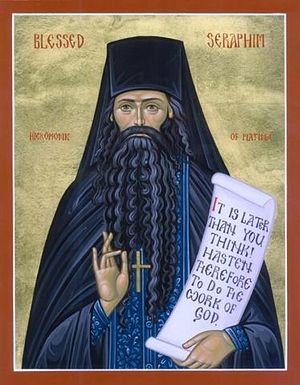 Photo: diakonima.gr Fr. Seraphim was acutely aware of the uncompromising enmity between the demonically-inspired modernistic world-view and the Holy Spirit-inspired Orthodox world-view, having exposed in his own life the illusions and emptiness of modernity. His writings have an uncompromising polemical tone that is somewhat disconcerting or off-putting to a first-time reader raised on the “democratic” illusion of “tolerance,” that shallow open-mindedness of which modern man is so proud, but which is actually the denial of that hierarchy of values founded on the revelation of the eternal mystery of the Triune God through the God-Man Jesus Christ. That hierarchy of values which is the manifestation in human souls of the sustaining and life-giving power of the Holy Spirit in the Holy Church, that hierarchy of values, which is the living tradition of Holy Orthodoxy, is a Spiritual matrix in which is formed a truly Orthodox mentality, way of feeling, and formation of the will. This is what St. Paul speaks of in 2 Timothy 1:7: For God but not given us the spirit of fear; but of power and of love, and of a sound mind. The spirit of power (Orthodox formation of the will), of love (Orthodox soul or way of feeling), and of a sound mind (Orthodox mentality) is called by the Christian tradition the mind of the Fathers.
Photo: diakonima.gr Fr. Seraphim was acutely aware of the uncompromising enmity between the demonically-inspired modernistic world-view and the Holy Spirit-inspired Orthodox world-view, having exposed in his own life the illusions and emptiness of modernity. His writings have an uncompromising polemical tone that is somewhat disconcerting or off-putting to a first-time reader raised on the “democratic” illusion of “tolerance,” that shallow open-mindedness of which modern man is so proud, but which is actually the denial of that hierarchy of values founded on the revelation of the eternal mystery of the Triune God through the God-Man Jesus Christ. That hierarchy of values which is the manifestation in human souls of the sustaining and life-giving power of the Holy Spirit in the Holy Church, that hierarchy of values, which is the living tradition of Holy Orthodoxy, is a Spiritual matrix in which is formed a truly Orthodox mentality, way of feeling, and formation of the will. This is what St. Paul speaks of in 2 Timothy 1:7: For God but not given us the spirit of fear; but of power and of love, and of a sound mind. The spirit of power (Orthodox formation of the will), of love (Orthodox soul or way of feeling), and of a sound mind (Orthodox mentality) is called by the Christian tradition the mind of the Fathers.
Fr. Seraphim immersed himself fully, even saturated himself, in the mind of the Fathers. Gradually (although by the yardstick of what seems possible to us in this spiritually degraded age, it happened with astonishing, almost impossible speed and completeness), Fr. Seraphim’s soul was transformed by Tradition (the life of the Holy Spirit in the Church) into a flaming sword, capable of rending the veil of delusions of the modern world and revealing the Holy Place: the one, holy, catholic, and apostolic and Orthodox Church.
Fr. Seraphim became a living link with the Holy Fathers, exactly in the way foretold by the demon who appeared to Elder Sophronius, one of the disciples of Elder Paisius Velichkovsky. Revealing his hatred for spiritual books, the demon says that these “wretched rags” teach “simple fools” to live like the Christians of old. The demon reasons in a disconcertedly modern way: He seeks “peace and concord” with the Christians; he complains about the “unrelenting and uncompromising” enmity of traditional Orthodox piety; he pleads for “tolerance” and “moderation” and open-mindedness among the monks. Fr. Seraphim was one of the “simple fools” most feared by the demon. Inspired by the writings of the Holy Fathers, he took up arms against the Adversary and put into practice the traditional practices of the Christians of old: unceasing prayer, unceasing warfare, fasting, examining and confession of thoughts, keeping vigil, living as a stranger in this world. In the writings of Fr. Seraphim there breathes the unquenchable spirit of the ancient, yet timeless Orthodox piety: not the spirit of fear or tolerance so-called, but the spirit of power, of love, and of a sound mind.
Unlike many Western Converts to Orthodoxy, Fr. Seraphim was able to avoid the three great traps of the convert: anti-Westernism, over-correctnes, and ecclesiastical externalism. Instead, he practiced and advocated what he called, following the teaching of St. John Cassian and other Fathers, the Royal Path: a balanced sober approach to Orthodoxy and Tradition that emphasized the freedom of the Orthodox way of life as well as the authority of its truth. For Christ Himself said, Ye shall know the truth, and the truth shall make you free (John 8:32.) If holy Orthodoxy is the fullness of Christian truth, then its practice, if it is in accordance with the traditions of the Fathers, must make one free. Over-correctness, or zeal not according to knowledge, is precisely an all-too-human limitation of freedom in Christ, and a return to the very pharisaism that Jesus Himself rejected. Anti-Westernism is an all-too-human identification of the truth of Christ with ethnic or historical concerns. Externalism in Church life is an all-too-human emphasis on those aspects of the Church that are of this world, with a corresponding incapacity to perceive and participate in its other-worldly essence. The Royal Path, as taught by Fr. Seraphim, is freedom in authority and authority in freedom, based on self-knowledge, discernment, and sobriety. It is the safest, truest, swiftest way to Paradise, but it is not easy. It demands constant unseen warfare, suffering of heart, devotion, compassion, scrupulous self-honesty, and ruthless self-criticism. Such is what Fr. Seraphim asked of his spiritual children.
The restoration of an Orthodox way in the West
How was Fr. Seraphim able to avoid the pitfalls facing the convert? What is the significance of his example for universal Orthodoxy today? These two questions are related, for Fr. Seraphim's spiritual journey contains an answer not only for the individual convert but also for the entire Orthodox Tradition.
I believe the answer lies in Fr. Seraphim’s penetrating insight into and profound criticism of modernity. His understanding of the real conditions of modern life freed him from the cultural conditioning of his Western upbringing. But he also was able, paradoxically, to fulfill the spiritual possibilities of the Western soul. This he accomplished by his refusal to reject everything Western in favor of an ethnically-oriented Eastern Orthodoxy.
Through all his researches, Fr. Seraphim came to believe that only a culture with a strong living tradition had a chance against the corrosive and destructive forces of modern life. The only force capable of withstanding modernity is tradition; but tradition is not mere conservatism, nor is it primarily a cultural phenomenon. The essence of tradition is religion: It exists only through Divine revelation; it survives and sustains itself through the vicissitudes of time and history in this world only by means of its timeless, trans-historical, otherworldly qualities. Fr. Seraphim did not find these qualities in non-traditional Western Christianity, so he turned to the Far East where the religious tradition was stronger; but there, too, he discovered that wherever the influence of modern life penetrated, it usurped and undermined traditional forms. It was only when he came into contact with Russian Orthodoxy that he discovered a tradition that has withstood every imaginable blow from the forces of history, and is still capable of resisting the corrosive, dissolving influences of modernity.
It was through the providential guidance of a righteous man of God, Archbishop John Maximovitch, that Fr. Seraphim embarked upon his life’s work: the restoration of the Orthodox way of life in the West. Archbishop John loved and venerated the Orthodox saints of the West, the holy and just men and women of the West before the Schism, whose lives shone like the stars, but who were being unjustly neglected in the contemporary Orthodox world. He inspired Fr. Seraphim to begin studying and translating the lives and work of such Western Saints as St. John Cassian.
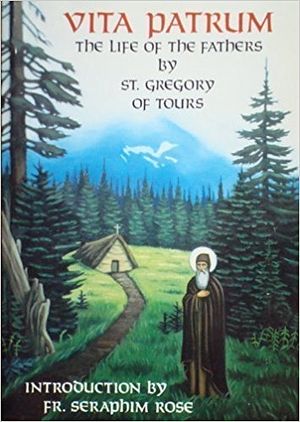 Photo: amazon.com One of Fr. Seraphim’s most important achievements was the English translation of St. Gregory of Tours’ never-before-translated Vita Patrum, a Western patericon of utmost importance because it provides direct evidence that the Christian roots of Western culture are unquestionably Orthodox in spirit, substance, form and savor.
Photo: amazon.com One of Fr. Seraphim’s most important achievements was the English translation of St. Gregory of Tours’ never-before-translated Vita Patrum, a Western patericon of utmost importance because it provides direct evidence that the Christian roots of Western culture are unquestionably Orthodox in spirit, substance, form and savor.
Fr. Seraphim realized that without tradition, not only every culture, but every organization, every parish, even every contemporary individual is helpless before the all-pervasive influences of modernity; but to adhere to Tradition did not mean blind conservatism, worship of the past, or rigid uniformity of ecclesiastical policy. It meant, for Fr. Seraphim, to acquire the mind of the Fathers. Here is more than mere unbroken historical continuity imposed by the Church “discipline” or thought control or outer correctness. The holy Tradition is, above all, spiritual and ontological identity in mind, heart, life, spirit. “This is the apostolic faith, this is the faith of the Fathers, this is the Orthodox Faith, this faith has established the universe.”
Without this living identity with the Patristic spirit, Fr. Seraphim realized, the souls of Western converts would be in great danger of being internally split between a “traditional” pattern of “piety” and worship and an untraditional pattern of mind and an unchanged heart. The “born” Orthodox are equally susceptible to this condition. There is no compromise between the Patristic and the modern spirit. One or the other must triumph. What good is all the fullness and richness of traditional Orthodoxy if the convert embraces Orthodoxy in an outward way yet remains unchanged in heart and mind? Fervency and zeal must not be mistaken for inwardness and transformation. In such cases, the very beauty and power of the ancient forms of the Orthodox Church would be chains binding the soul in its delusions. As the Apostle says, For ye have not received the spirit of bondage again to fear; but ye have received the spirit of adoption, whereby we cry, Abba, Father (Romans 8:15); and again: He that searcheth the heart knoweth what is the mind of the Spirit, because he maketh intercession for the Saints: according to the will of God (Romans 8:27).
Universal Orthodoxy
Throughout his writings, Fr. Seraphim repeatedly uses such words as “savor,” “flavor,” and “taste” to convey to his readers something of the undefinable yet tangible essence of the Patristic spirit.[1] There is a unique savor to the genuine Orthodox Tradition, he told his spiritual children, and you must taste it. Only when you “taste and see” the flavor of the genuine teaching of the Holy Fathers will you know how to discern the false from the true, the inward from the outward, in Orthodoxy.
As an instructor and transmitter of the Orthodox Tradition, Fr. Seraphim was a realist. He knew, in dealing with converts, that it was unrealistic to ignore or reject the thousand years of Western cultural and psychological experience in which their souls were formed. A teacher of Orthodoxy should not attempt to convey the impression that Western culture was of no value in order to influence Western students in favor of an “Eastern” Orthodoxy.
The Orthodox Tradition, Fr. Seraphim realized, is not diminished if it recognizes the genuine values and virtues of Western culture. Orthodoxy, if it is the fullness of truth, should reveal such largeness of soul, such generosity of spirit, that anything of value in any culture is purged and transfigured in its radiance, and its own otherworldly essence is enhanced and strengthened in its earthly manifestation by such transfigured values. This is what happened when Orthodox Christianity met and baptized the Russian folk soul: A Christian culture was produced that received the torch from faltering Byzantium and held it high for a thousand years. Fr. Seraphim taught that the Russian experience holds a crucial lesson for latter-day Christians.
So too when the culture of the Celts was baptized by Orthodox missionaries from the East: The Celtic soul was instantly enkindled, producing an explosion of monks, monasteries, and missionaries, whose light was the glory of Orthodoxy in the West for hundreds of years. Fr. Seraphim wrote numerous articles proving that the roots of the Western soul, despite all appearances, rest in Orthodoxy.
Of course, the contemporary secular culture of the West is not the culture of Martin of Tours or Vincent of Lerins. No one recognized that more acutely than Fr. Seraphim, but he also knew that ethnicity and over-correctness, no matter how Orthodox, would suffocate the souls of Western converts. Furthermore, unlike fourth-century Ireland or tenth-century Russia, the West has known a Christianity of one sort or another for a millennium and more. Modernity is not innocent paganism—it is a rejection of Christian values as powerless and ineffective.
The answer, according to Fr. Seraphim, is “universal” Orthodoxy, the trans-historical, transcendant teaching of the Holy Fathers and God-bearing saints, the savor of which will transform any cultural conditioning, Eastern or Western. For “savor,” as Fr. Seraphim well understood, is precisely the tangible grace of Patristic spirituality; and he was fully confident that the taste of that grace (which is, after all the Mind of the Spirit [Romans 9:27]) was more than equal to the task of forming the souls of Western converts. In this, Fr. Seraphim shows a greater faith in the power of the Orthodox Tradition than do his “super-correct” detractors.
All the Orthodox jurisdictions in the West (and in the East as well) struggle with the problem of modernity. None seems to have found a real solution as yet. Neither ecumenical revisionism nor old-world conservatism provides an effective answer to the allure of contemporary culture in these latter days. The former trades the precious pearl of traditional Orthodoxy for the fool’s gold of “relevance” according to today’s standards; while the latter buries its talent in the protective earth of old-world values, thus isolating itself and rendering the genuine Tradition which it protects incapable of responding to the many souls hungering for the fullness of truth.
It is to his everlasting credit and our great good fortune that Fr. Seraphim found a way between these two extremes, a way that was not an innovation, but the timeless, yet ever-vital path of the Holy Fathers. The Royal Path is absolutely sober and brooks no compromise with the “strong delusion” of modern times; yet, the Royal Path, as taught by Fr. Seraphim in accordance with the mind of the Fathers, has the power to empower the soul to engage in unseen warfare and to work out its salvation along tested, proven, traditional lines. In Fr. Seraphim we see the reawakening of Patristic spirituality, not in academic isolation, but in the real world of monastic struggle, poverty, obedience, piety. The life of Fr. Seraphim Rose shows us that the way to recover our souls as Westerners is to return to the roots of the real culture of the West—Patristic Christianity, to form our souls, not of the pablum and poison of contemporary culture, but on apostolic faith, catacomb spirituality, Orthodox piety, and the mind of the fathers.
Epiphany vol. 9, no. 4, Summer 1989

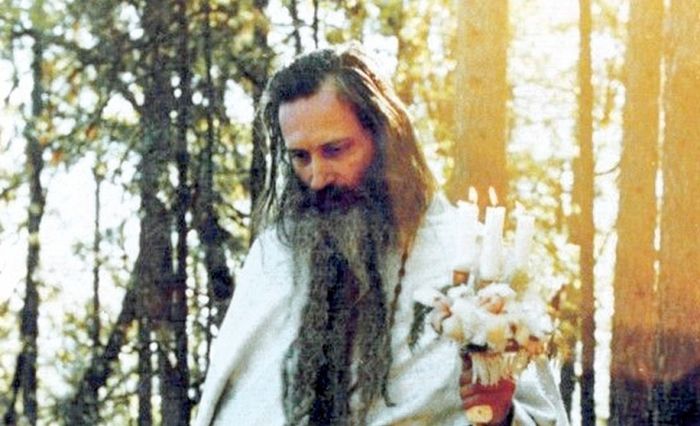
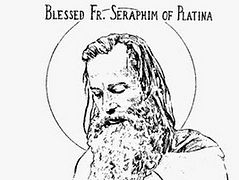
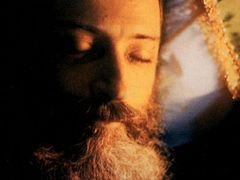
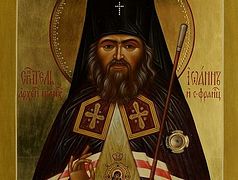
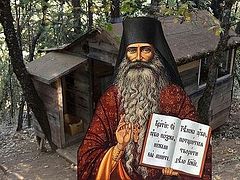
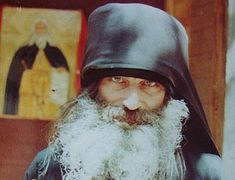
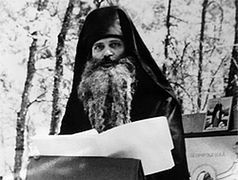
After all, the utter inanity of the rants by some "cradle" (as if anyone could be born Christian after the Fall) Orthodox is testified by the fact that the schismatic Pope(s) was a "cradle" Orthodox.
These people, who dangerously resemble the older brother of the prodigal son, should better employ their time, making their women cover their head in the church, for example, or fighting unceasingly the heresy coming from the "born-the-right-way" Phanar and the stinking spirit of the world emanating from the "Orthodox-since-conception" Greek archdiocese in America, as well as censuring all the hierarchs with impeccable Orthodox pedigree signing the documents produced by a robber council in Crete or haunting masonic lodges around the world.
Could someone enlighten us peasants from the east as to what those ''values'' and ''culture'' entail please?
I think westerner converts who have come to Orthodoxy have a massive problem with crucifying their prideful rational mind - which is how Fr Seraphim Rose of blessed memory became the spiritual giant that he is - by rejecting his thoughts as being superior to all and everything and humbling himself to the mind of the Fathers (I guess this is why a good many westerners despise him so deeply in the way and manner in which they do). Instead, they come to Orthodoxy and then become our teachers ''telling us'' that things are this way and not that. You can see it in some of the most absurd rambling articles appearing on this website by western writers. I do not recognise any of the Orthodox Faith in that marshmallow candy they have to offer. There are only a small handful of writers from the West I could recommend to cradles - Fr Seraphim Rose, Fr Spyridon Bailey, Fr Seraphim Holland, Fr Phillip LeMasters and Fr Thaddeaus Hardenbrook. As for the rest. Nyet.
After the completion of the repentance of the Rus', the re-chrismation of the Western man is the most important task in the battle to retard the incoronation of the antichrist, so that more souls may be saved before the end.
Father Seraphim of Platina is the first saint that the Western man has produced in a millennium, in my poor understanding, and it would be extremely important for the Church's hierarchies to recognize it.
Extremely important, not necessary though.
Holy father Seraphim, pray and intercede to the Lord for us!